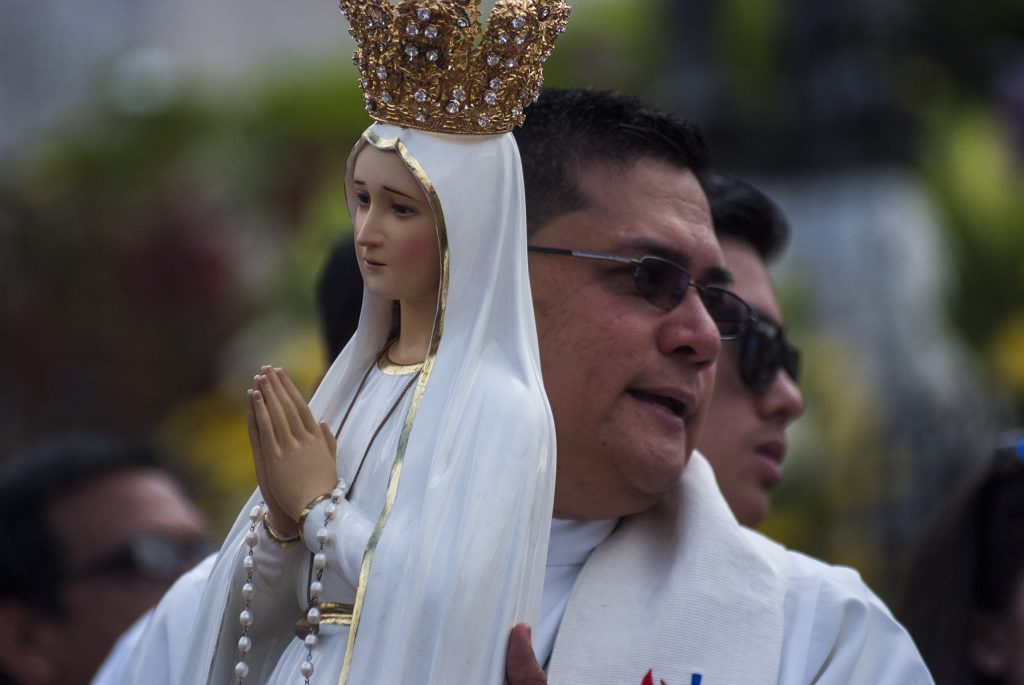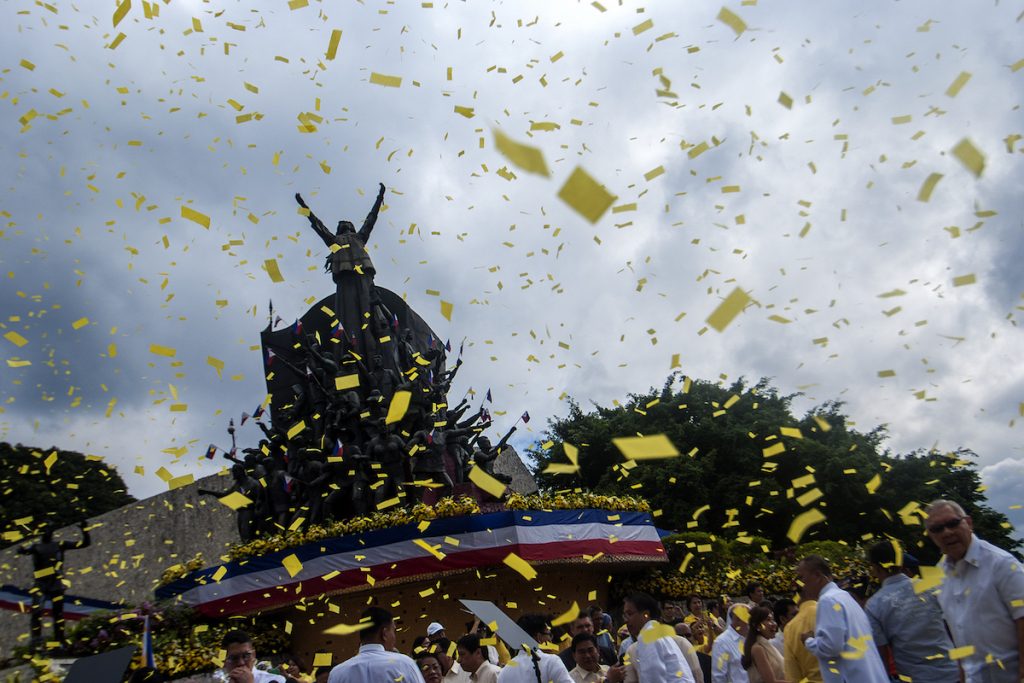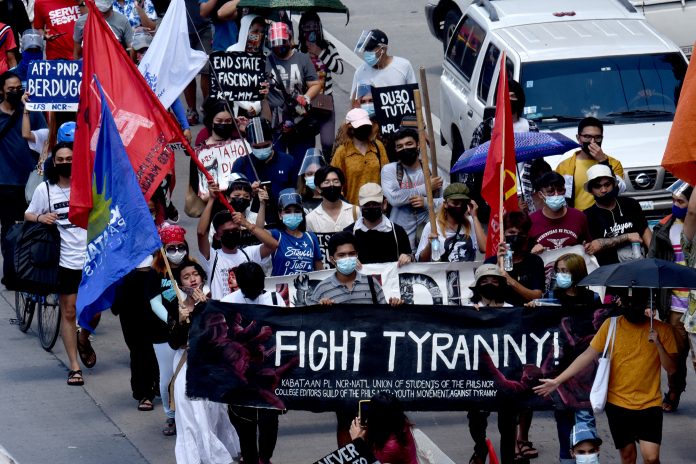When Marcos proclaimed martial law in 1972, I was still in the elementary years. I heard it from the radio in our far-away barrio. My father, who was an elementary school teacher, explained it to me, but my young mind could not fully understand what it meant. He also explained the ongoing Vietnam war which made things more complicated.
What I remembered then was that we need to line up in town to get some supply of yellow corn. Corn is the staple food in Cebu, but it was “white” corn grits that we bought. This time we could only buy “yellow” and in small amount. Some people say this corn are used to feed horses, not humans.
We are a big family. Supply hardly lasts a for week. The next week, I joined my father again, queueing up like beggars in the poblacion to get those yellow food for “horses.” At one point, the supply were not enough for us all.
Regardless of what they say about Imelda’s Green Revolution project, it was an epic failure for us. We had no food on our tables even if my father had the meager capacity to buy. If you think that martial law was the “golden years,” yes it was, because we had “golden corn.”
I went to join and listen to vocation talks while in high school. I was still very young but I could already feel the stirrings of a vocation in my heart.
There was a Redemptorist priest who went around the small towns of Cebu to recruit for vocations. His name was Father Rudy Romano, CSsR. He was a different kind of priest. He talked to us under the trees in our school, not inside classrooms. My young inquisitive mind was really captivated by his story. He said that he was once assigned in the mountains of Mindanao. He had a horse, which he used in traversing hilly communities of the poor. Instead of a gun that some priests brought with them in those violent times in Mindanao to protect themselves, he had only the crucifix in his pocket or on the belt of his cassock.
The priest mounted on a horse caught my imagination. I wanted to be assigned in those mountains in the peripheries, and bring the cross to the poor. One of its perks is to have a horse. Well, until today, I still do not have a horse, hahaha.
To make the long story short, I joined the Vincentians not the Redemptorists, but when I was in the seminary, I heard that Father Rudy Romano disappeared, and until today the Redemptorists do not know what happened to him. He was very critical of Marcos and his regime. During my ordination, I would have wanted to invite him because the image of a priest on mission to the peripheries still burns in my heart. Wherever I have been assigned in the past 33 years of my priesthood, it is still the driving metaphor in my ministry. But Father Rudy could no longer to be found. He was one of the martyrs of martial law.
He was not alone. There were many others and their families can tell us their stories of pain and suffering. If you think martial law was the golden years of Philippine history, listen to the victims and their ordeals. Many of them are still alive. Ask them to tell their stories.
In those times when all media were controlled by Marcos, we were scavenging for news in “mimeographed” sheets, hungry for alternative news from the underground. We pass them around, xeroxed them for all. We were critical of the stories that came from Malacañang. We wanted to know beyond what was forced into our throats by the Marcos media.

Do not believe the trolls today. It is the same propaganda all over. These digitally invented messages aim to destroy history and drown the voices of the victims.
Fast forward to August 21, 1983. It was a Sunday. As young Vincentian novices then, we were spending the whole day of Sunday in the apostolate at the communities in the mountains of Angono, Rizal with a group of subsistence farmers near the famous prehistoric petroglyphs in one of its caves.
When we went home that late afternoon, what met us was the news of Ninoy Aquino’s assassination on the tarmac. There was the drama of Galman and all the commotion with it on our TV screen. The news was not clear then — the unknown assassin did it, the communists planned it, etc. But the news was very disturbing.
We were martial law babies. We heard of the First Quarter Storm. We heard of the Church repression and of Church leaders who went missing. We heard of farmers and political prisoners who disappeared. But this was a bit far from our young minds. Even Ninoy’s death. No one among us knew Ninoy at close range. We sang “Tie a yellow ribbon” then, but that was all about it.
Yet a moral chord was hit within our young minds that night. Something was definitely wrong. There was something not in order. Something happened that was certainly evil.
On the rooftop of our Angono seminary that overlooked Laguna de Bay and the Pasig, our young minds — lured by the McGyver imagination of our generation (millennials do not anymore know of McGyver, hahaha) — were trying to figure out how to launch an attack at the Palace through a guided missile by the Pasig River.
Of course, it was born out of our frustration that we were stuck on top of this mountain and could not do anything at all, like the rest of “imprisoned novices” of our time.
But there was something that we did that Sunday night that I will never forget. I do not know if my classmates still remember. We had this old Spanish Vincentian priest who was our novice master. He was very conservative, politically and theologically. We asked him a question that only young innocent minds can ask: “Can we pray for the death of the dictator?”
We were thinking: if he has wrecked havoc to thousands and millions, would it not do the country good if he goes? Is it even moral to think so?
To our surprise, he said: “Yes, you can.” We did not expect an old conservative Spanish priest would agree with us. From then on, we always included that in our evening prayer intentions.
God did not listen to our prayers. At least, not that soon.

But that sincere prayer enlarged our young hearts toward a sense of justice and fairness, that things could not go on this way, that the dignity of peoples should be defended at whatever cost, that our lives could not just go on as usual while the people around us are dying — all of them waiting for justice and our human action.
That one day, God will come and render us justice. For God listens to the cry of the poor, as the psalmists keep repeating to us.
It took three years after that, when this same group of young novices — now in our last years of theological training — took to the streets to join the many others who have awaken in the EDSA revolution that Ninoy started to inspire in our hearts three years earlier.
I really hope that we do not need three years to do it again. The same evil forces are back. The son — Marcos Jr — proclaims himself as the successor to bring back the old horrendous and violent glory. The daughter of Duterte is a new cohort. And the old oligarchs and plunderers join in the party called the UniTeam. All these opportunists need to answer to the people.
Things cannot remain this way. They cannot come back to power. We cannot survive to experience impunity and plunder twice or thrice over.
TAMA NA. SOBRA NA. LABAN NA. That was our call then. It is the same call today.
P.S. I invite my friends who had experiences of Martial Law to share their stories. Our young people value personal witness. They are waiting for us to narrate what we went through. For all you know, not all of them are enamored with TikTok. They reading and are listening. We need to counter Marcos-Duterte historical revisionism. It is destroying us.
Father Daniel Franklin Pilario, C.M. is a theologian, professor, and pastor of an urban poor community in the outskirts of the Philippine capital. He is also Vincentian Chair for Social Justice at St. John’s University in New York.
The views expressed in this article are the opinions of the author and do not necessarily reflect the editorial stance of LiCAS.news.









